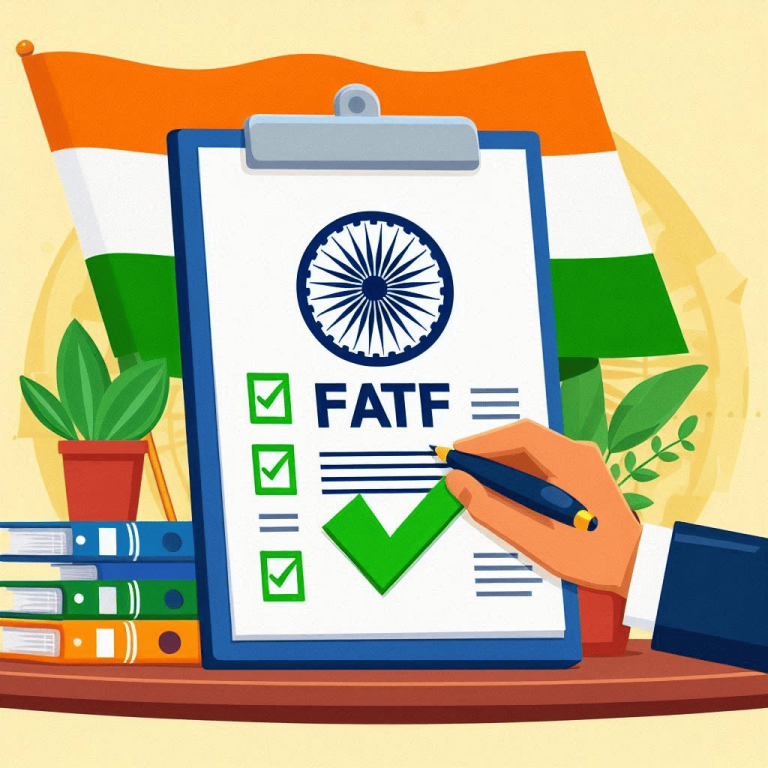- 7 minutes read
India’s Outstanding Outcome: FATF Evaluation 2023-24 For AML/CFT Standards
On June 28, 2024, the Financial Action Task Force (FATF) announced that India has reached a “high level of technical compliance” with its standards for combating money laundering and terrorist financing. This important milestone was revealed at the FATF’s plenary meeting in Singapore, following an extensive year-long evaluation process, which included an on-site visit to New Delhi. The FATF’s findings highlight India’s strong mechanisms for addressing these critical issues and demonstrate the country’s commitment to maintaining international financial security standards.

Understanding The Role Of FATF
The Financial Action Task Force (FATF) is an intergovernmental organization established by the G7 in 1989. Its main goal is to set global standards for fighting money laundering, terrorist financing, and other threats to the integrity of the international financial system. The FATF monitors member countries’ progress in implementing these measures and conducts mutual evaluations to assess compliance and effectiveness.
FATF Classification And Its Implications
The FATF classifies member countries into four categories: regular follow-up, enhanced follow-up, grey list, and black list, with regular follow-up being the highest category. Sources indicate that only five G20 nations including India, have achieved this status after their mutual evaluation report. Out of 177 countries assessed by the FATF and its Regional Bodies (FSRBs), only 24 nations are in the regular follow-up category.
The mutual evaluation process is rigorous, based on 40 recommendations and 11 immediate outcomes. To be placed in regular follow-up, a country must score high in at least 33 recommendations and five immediate outcomes. Notably, even developed countries like the US, Australia, Canada, New Zealand, Singapore, and several European nations are in the enhanced follow-up category due to significant deficiencies.
India's Evaluation Process
The FATF’s mutual evaluation process involves a thorough assessment of a country’s legal, regulatory, and operational frameworks for combating money laundering and terrorist financing. For India, this process started with a preliminary review, followed by an on-site evaluation conducted by an FATF team. The team engaged with senior officials from various Indian agencies, including the Enforcement Directorate (ED), the income-tax department, the Central Bureau of Investigation (CBI), the Directorate of Revenue Intelligence (DRI), and the ministries of finance and external affairs.
Initially scheduled for September 2020, the evaluation was delayed due to the COVID-19 pandemic. However, India used this time to enhance its anti-money laundering (AML) and counter-terrorist financing (CFT) mechanisms, making significant legislative and operational improvements.
Key Findings Of The FATF Report
A. Areas of Significant Progress
The FATF's mutual evaluation report on India highlights several areas where the country has demonstrated significant progress and effectiveness:
- India has developed a strong understanding of the risks associated with money laundering (ML) and terrorist financing (TF), allowing it to effectively implement targeted measures to mitigate these threats.
- On the global stage, India actively participates in combating cross-border financial crimes by collaborating with international partners. This cooperative approach has significantly strengthened efforts worldwide to address ML and TF.
- Significant progress has been made in India to enhance transparency by ensuring access to both basic and beneficial ownership information. This transparency is crucial for ensuring accountability in financial transactions and preventing misuse of corporate structures for illegal activities.
- The use of financial intelligence plays a crucial role in India's strategy against ML and TF. By leveraging financial intelligence effectively, India can identify and disrupt illicit financial activities, thereby bolstering its AML/CFT framework.
- Indian authorities have successfully deprived criminals of their assets, impacting their operational capabilities significantly. This strategy has proven effective in disrupting organized crime networks and terrorist activities within the country.
- In tackling proliferation financing, India has implemented rigorous controls to prevent funding related to weapons of mass destruction. These measures not only support global non-proliferation efforts but also underscore India's commitment to international security and stability.
B. Areas of Improvement
While the FATF report reflects overall positive feedback, it also identifies several areas where further enhancements are necessary.
- The report highlights the importance of strengthening supervision and taking proactive measures in non-financial sectors to bolster India’s efforts against money laundering (AML) and terrorist financing (CFT). Enhancing compliance across all sectors is crucial for effectively mitigating risks.
- Furthermore, the report raises concerns regarding delays in concluding prosecutions related to money laundering and terrorist financing. Swift and decisive legal actions are essential to maintain the credibility of regulatory initiatives and maximize their deterrent impact.
- Additionally, there are significant apprehensions expressed about the oversight of Non-Governmental Organizations (NGOs) in India. It is imperative to sector implement robust measures against terrorist financing within the non-profit, fostering proactive engagement with Non-Profit Organizations (NPOs) to mitigate risks effectively. Recent amendments to regulatory frameworks have intensified scrutiny of NGOs, highlighting the need to align India’s approach with a risk-based strategy that prevents misuse while supporting legitimate NPO activities.
6 Major Steps Taken By India To Enhance Its AML/CFT Framework
India has implemented significant legislative and regulatory reforms to align with FATF recommendations and strengthen its Anti-Money Laundering (AML) and Counter Financing of Terrorism (CFT) framework.
- Amendments to the Prevention of Money Laundering Act (PMLA) have expanded its scope to include non-government organizations (NGOs) and cryptocurrencies, aiming to regulate illicit financial transactions involving virtual digital assets (VDAs).
- A noteworthy change since the last review is the revised definition of Politically Exposed Persons (PEPs) under the PMLA, now in alignment with FATF standards. This update enhances the identification and monitoring of transactions involving individuals holding influential positions.
- Introduced in 2018, the Fugitive Economic Offenders Act empowers authorities to attach and confiscate assets of economic offenders evading Indian law outside the jurisdiction of local courts, particularly in cases involving amounts exceeding ₹100 crore. This legislation strengthens India's capability to deter and prosecute economic crimes effectively.
- Since the last mutual evaluation in 2010, India has made substantial strides in combating money laundering, resulting in over 5,000 cases registered, 755 arrests, and the attachment of properties valued at more than ₹1.21 lakh crore by the Enforcement Directorate (ED).
- India has also fortified its legal framework to address emerging challenges in the financial sector, providing robust tools for enforcement. The establishment of a joint working group comprising 22 central agencies has facilitated coordinated efforts, ensuring comprehensive compliance with FATF standards and enhancing effectiveness in tackling complex financial crimes.
- The Reserve Bank of India (RBI) has intensified scrutiny of fintech companies to ensure compliance with AML laws and monitor suspicious transactions effectively. This oversight is crucial given the rapid growth of the fintech sector and its potential vulnerabilities.
Benefits Of Favorable FATF Rating For India
- Enhanced Access to Global Financial Markets and Increased Investor Confidence
- Global Expansion of Unified Payments Interface (UPI)
- Facilitation of Overseas Investments by Domestic Companies
Future Directions In AML/CFT Measures For Indian Companies
While the FATF’s evaluation acknowledges India’s progress, ongoing efforts are crucial to sustain and enhance its AML/CFT framework. Key priorities include strengthening supervision in non-financial sectors to ensure full compliance and bridge existing gaps. Simultaneously, expediting prosecutions is vital to reinforce the deterrent effect of AML/CFT measures, emphasizing the importance of timely legal actions in maintaining effectiveness.
Engagement with Non-Profit Organizations (NPOs) is essential to raise awareness about terrorist financing risks and align compliance measures with a risk-based approach, minimizing vulnerabilities. Leveraging advanced technologies such as artificial intelligence and blockchain can significantly boost capabilities in detecting and preventing illicit financial activities, enabling enforcement agencies to proactively combat emerging threats.
Companies should prioritize advanced AML and sanctions screening technologies to mitigate financial risks and enhance regulatory compliance, bolstering credibility in global markets. Continuous training and capacity building for enforcement personnel are critical to equip them with the necessary skills and knowledge to implement evolving AML/CFT measures effectively.
- #FATF
- #India
- #MutualEvaluationReport
- #Compliance






